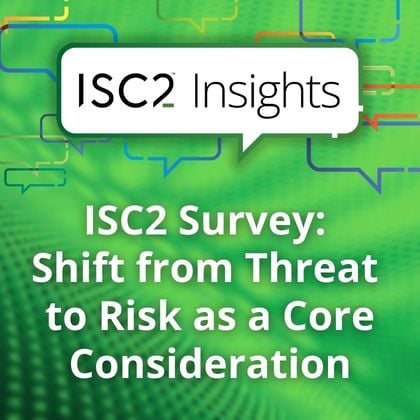For Neurodiversity Pride Day, we sought to better understand the contribution that neurodiverse individuals make to the cybersecurity ecosystem and the challenges they encounter working in these roles.
Neurodivergence in the workplace is an important consideration for organizations. More employers are recognizing the importance of understanding the needs of their full spectrum of cybersecurity teams. However, workplaces, including the cybersecurity workplace, continue to present challenges for the neurodivergent, particularly due to the individual nature of neurodivergent circumstances
Autism advocate Dr. Stephen Shore said, “If you’ve met one person with autism you’ve met one person with autism,” his statement succinctly illustrating that neurodivergence and those on the spectrum seldom share the same combinations of conditions, perceptions and challenges.
As part of the most recent ISC2 Cybersecurity Workforce Study, we looked at neurodiversity within the cybersecurity talent pool. Of the 15,852 global respondents that answered, 2,014 considered themselves to be neurodivergent, 13% of the total survey respondent base. The Royal College of Nursing defines Neurodiversity as the natural diversity in how our brains operate and interpret information. Neurodivergence is the term for when someone's brain processes, learns and/or reacts differently from what is considered "neurotypical", with both formal and informal diagnosis often used to determine this. Neurodivergent conditions include Dyslexia Dyspraxia (also called Developmental Coordination Disorder, or DCD) Dyscalculia Attention Deficit Hyperactivity Disorder (ADHD) and Autism Spectrum Condition (ASC).
Among our neurodivergent colleagues who participated in the study, we learned a number of things about their career specialisms and how neurodiverse representation differs from the overall respondent average, as well as their views and concerns on a variety of issues impacting the cybersecurity workforce and opportunities to progress.
Neurodivergence and Cybersecurity Career Paths
Research shows there are a few areas where neurodivergent cybersecurity professionals are represented in greater or lesser numbers.
While not representing large proportions in our study, participants identifying as neurodivergent hold roles in some specialized areas of cybersecurity at higher rates than those who don’t identify as neurodivergent. For example, 6% of neurodivergent participants work in data protection and privacy, compared to 5% of the overall respondent base. Meanwhile, 5% of neurodivergent participants deal with cyberthreat intelligence compared to 3% of the entire respondent base. There is a similar pattern for those working in cryptography and communications security roles – 3% of neurodivergent participants work in this area compared to 2% of all survey participants.
Conversely, fewer neurodivergent participants work in secure operations roles (5%) compared to the overall average response (7%). Neurodivergent respondents are also less likely to be in cybersecurity management roles (12%) compared to the overall respondent average (14%).
Cybersecurity Job Satisfaction Lower Among Neurodiverse
Workplace and role satisfaction are important factors when understanding if someone can thrive in their chosen career path. These factors are also particularly important for the neurodiverse community, who may need different things from their workplace and colleagues to thrive.
Neurodivergent respondents expressed lower levels of job satisfaction (60%) compared with those who said they did not consider themselves to be neurodivergent (68%). These compare with the overall survey average of 66% who are satisfied in their role. Neurodivergent respondents also highlighted that they struggle more to be authentic and “fully myself at work.” Nearly half (44%) of neurodivergent respondents said this, compared to non-neurodivergent respondents (31%).
Feeling like you can be yourself at work significantly increased job satisfaction for all respondents. For both neurodivergent and non-neurodivergent respondents, job satisfaction levels were 19% higher when they felt they could be themselves at work. Neurodivergent participants reported 73% job satisfaction among those that feel like they can be themselves, falling to 54% for those who don’t feel they can.
However, respondents also noted positive perceptions of the cybersecurity field. When asked if cybersecurity is a field that is well-suited for people who are neurodivergent (e.g., autism spectrum disorder, ADHD, dyslexia, etc.), 73% of neurodivergent respondents agreed that it was. Similarly, when asked whether cybersecurity is a field that is welcoming of people who are neurodivergent, 68% of neurodivergent respondents said this was the case. In comparison, non-neurodivergent respondents perceive the cybersecurity field to be less supportive for their neurodivergent colleagues, with only 45% saying it was well-suited to neurodivergent colleagues and 49% saying it was welcoming.
Further to this, 74% said that an inclusive environment is essential for their team to be able to succeed, echoing the importance of organizations responding to the needs of all colleagues.
How to Support Neurodiverse Cybersecurity Team Members
To effectively support neurodivergent colleagues, organizations and managers should focus on creating an inclusive culture, implementing flexible work practices and providing tailored accommodations and support.
While cybersecurity roles may pose constraints on the flexibility that can be offered to an individual working in a given function, there are things to consider that may help a neurodivergent individual perform to their full potential and to fully use the facilities and resources available to them. This includes:
- Educating staff about neurodiversity
- Offering mentoring and support opportunities
- Providing flexible working schedules to help individuals to focus
- Adapting workspaces for sensory needs and assistive technologies
- Facilitating a choice of written, visual or auditory communication to accommodate different learning styles and communication preferences
- Promoting open communication about neurodiversity
Related Insights

.png?h=1080&iar=0&w=1080)
.png?h=500&iar=0&w=500)